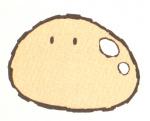Slime Drop
| Slime Drop | |||
|---|---|---|---|
 Artwork for Super Mario World 2: Yoshi's Island | |||
| First appearance | Super Mario World 2: Yoshi's Island (1995) | ||
| Latest appearance | Yoshi's New Island (2014) | ||
| |||
| |||
Slime Drops (originally known as Lemon Drops[1]) are enemies in the game Super Mario World 2: Yoshi's Island and Yoshi's Island: Super Mario Advance 3. They look like gooey lemon drops, and are only found in a few levels.
In Super Mario World 2: Yoshi's Island, Slime Drops are especially prominent in Salvo The Slime's Castle, where they break off of Salvo the Slime when he is hit. They also appear in Prince Froggy's Fort.
In Nintendo Puzzle Collection, yellow and blue Slime Drops cascade down the screen when a stage of Round 3 is cleared in the Action Mode of Yoshi no Cookie.
Slime Drops also appear in Yoshi's New Island in the level Slime Drop Drama. Yoshi can defeat Slime Drops by eating or jumping on them.
Slime Drops make a cameo appearance in Mario Party 4 in Slime Time. They appear as small blue drops instead of yellow.
Profiles and statistics
Super Mario World 2: Yoshi's Island
- Official Nintendo Player's Guide: Tasty morsels that drop from the ceilings, Lemon Drops help Yoshi replenish his egg supply.[1]
Gallery
Nintendo Puzzle Collection (Yoshi no Cookie)
Names in other languages
| Language | Name | Meaning | Notes |
|---|---|---|---|
| Japanese | スライム[2] Suraimu |
Slime | |
| French | Machâlow[?] | From Marshmallow | |
| German | Proto Schleimi[citation needed] | Proto Slime | |
| Korean | 슬라임[?] Seullaim |
Slime | |
| Russian | Слизнявчик[?] Sliznyavchik |
From "cлизняк" (sliznyak, slug) |
Trivia
- The original localized name of "Lemon Drop" references their bright yellow color and their behavior of dropping from ceilings (as well as being simply a small blob of liquid), creating an additional reference to the candy of the same name. It is likely that the name was changed to "Slime Drop" due to them no longer being bright yellow, thus making the original name less meaningful.
References
- ^ a b Super Mario World 2: Yoshi's Island Nintendo Player's Guide. Page 127.
- ^ 「スーパーマリオアドバンス3任天堂公式ガイドブック」 (Super Mario Advance 3 Nintendo Kōshiki Guidebook), page 17.

